All That She Can Be
Advances in research at Kennedy Krieger let Quinnlyn pursue all that’s possible.




including the newly elected Institute board chair, Ron Peterson, and vice chair, Matt Gotlin.

Advances in research at Kennedy Krieger let Quinnlyn pursue all that’s possible.




including the newly elected Institute board chair, Ron Peterson, and vice chair, Matt Gotlin.
Hello, Friends of Kennedy Krieger,
I hope you are having a safe and enjoyable summer.
It’s a new fiscal year at Kennedy Krieger Institute. New plans are taking shape, fresh cohorts of enthusiastic trainees are starting fellowships, and our schools and early childhood centers are preparing for the upcoming school year. Summer is also when we welcome new board members, elect a new slate of officers and honor those whose terms have concluded.
Dr. Nancy S. Grasmick has been Kennedy Krieger Institute’s board chair for the last six years, and her impact has been immense. Her strong leadership has helped us craft a robust strategic plan that will serve us for many years to come. She recently completed her term in office, but has agreed to stay on in an advisory capacity. Please join me in expressing heartfelt gratitude and appreciation to her for all she has done for Kennedy Krieger.
We are fortunate to welcome Ron Peterson as our new board chair. His decades of experience as a senior executive at The Johns Hopkins Hospital and his years of commitment to Kennedy Krieger make him the perfect leader to help guide our next chapter.
We are grateful to each of you, too. Your support for our mission is crucial to making the stories you’ll read in this magazine happen!

With gratitude, Bradley L. Schlaggar, MD, PhD President and
Chief Executive Officer
The Zanvyl Krieger Faculty Endowed Chair Kennedy Krieger Institute
INSTITUTE BOARD OF DIRECTORS
Chair
Ronald R. Peterson
Vice Chair
Matthew A. Gotlin, CFA
Preston G. Athey
Michael J. Batza Jr.
Sandra R. Berman
Van D. Brooks
Watchen H. Bruce
Richard W. Cass
Ikechukwu Tony Chukuka
Nancy S. Grasmick, EdD
Stephanie Cooper Greenberg
Michele J. Guyton, PhD
Richard J. Himelfarb
Renee R. Jenkins, MD, FAAP
Stephen M. Keelty
Daniel S. Koch, JD
Maynard McAlpin
Beth F. McGinn
Howard B. Miller, Esq.
Patricia J. Mitchell
Wendy L. Morris
Stephanie L. Reel, MBA
Bradley L. Schlaggar, MD, PhD
Kenneth C. Schuberth, MD
Andrew H. Segal, MD
Robert L. Sloan
Barbara S. Slusher, PhD, MAS
Amy B. Solomon
Francie C. Spahn
David G. Sweiderk
Paul S. Thesiger, MD
Melissa K. Trovato, MD
Alicia L. Wilson, JD
Judy C. Woodruff
Adam S. Zarren, Esq.
FOUNDATION BOARD OF DIRECTORS
Chair
Preston G. Athey
Vice Chair
Nancy S. Grasmick, EdD
Vice Chair
Patricia J. Mitchell
James M. Anders Jr., CPA, MBA, CGMA®
Alexander B. Bartlett
Robert A. Baruch
Linda S. Cameron, MBA
Richard W. Cass
Cynthia Cavanaugh
Aimee Fulchino
Alvin D. Katz, CPA
Beth F. McGinn
K. Brigid Peterson, JD
Ronald R. Peterson
Bradley L. Schlaggar, MD, PhD
Robert L. Sloan
Francie C. Spahn
David G. Sweiderk
EDITOR
Laura Thornton
ART DIRECTOR
Erin Parsons
DESIGNER
Tom Czajkowski
CONTRIBUTING WRITER
Laura Farmer
PROOFREADER
Nina K. Pettis
PHOTOGRAPHY
Robin Sommer, David Stuck and others
CREATIVE SERVICES DIRECTOR
Sarah Mooney
AVP OF MARKETING, PR AND COMMUNICATIONS
Lisa Nickerson
DIRECTOR OF PR AND SOCIAL MEDIA
Jessica Gregg
PR MANAGER
Taylor Gleason
SOCIAL MEDIA SPECIALIST
Katie Willmott
For media and public relations inquiries, email: Media@KennedyKrieger.org
For more stories, news and updates, visit: KennedyKrieger.org/Magazine
On the cover: Quinnlyn, 8, is seizure-free thanks to recent research advances at Kennedy Krieger.
Read her story on Page 6.
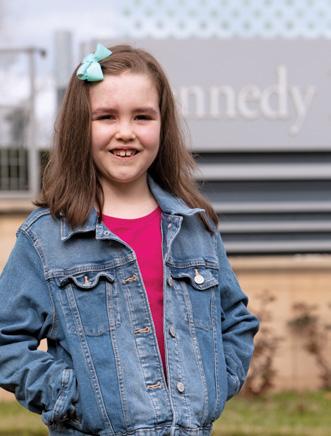

Recent advances in treatment for SturgeWeber syndrome at Kennedy Krieger Institute have allowed Quinnlyn to remain seizure-free while living a

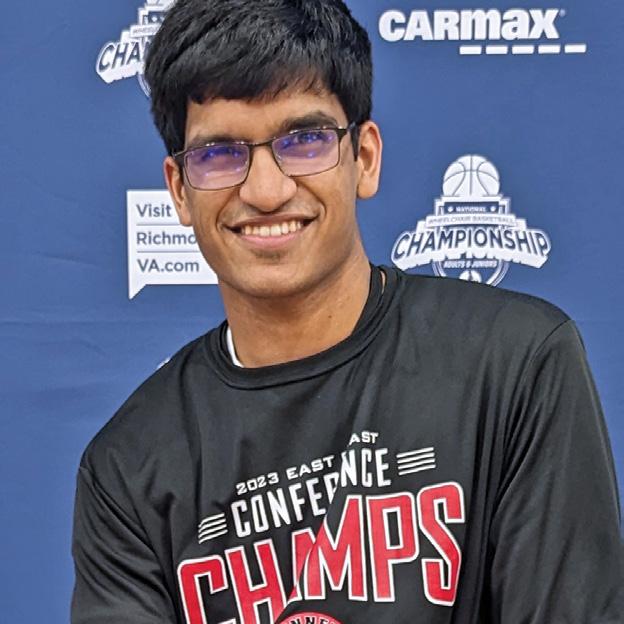
Rohan gives it his all when working with others.

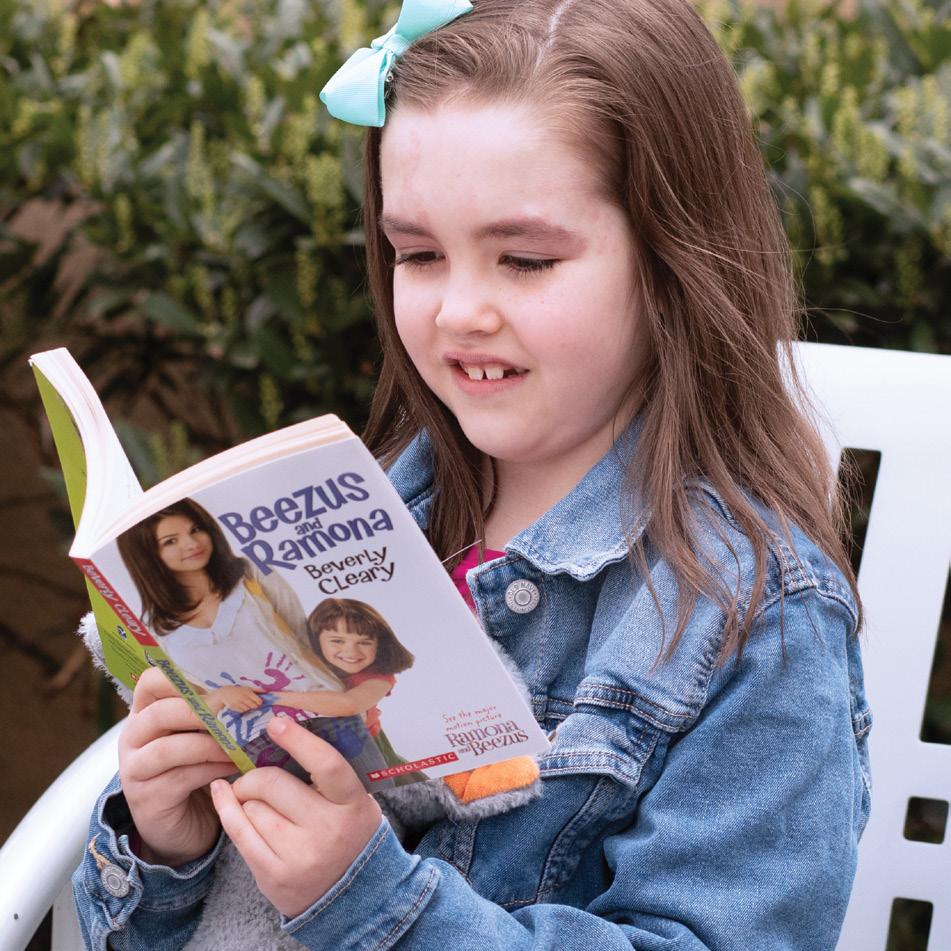
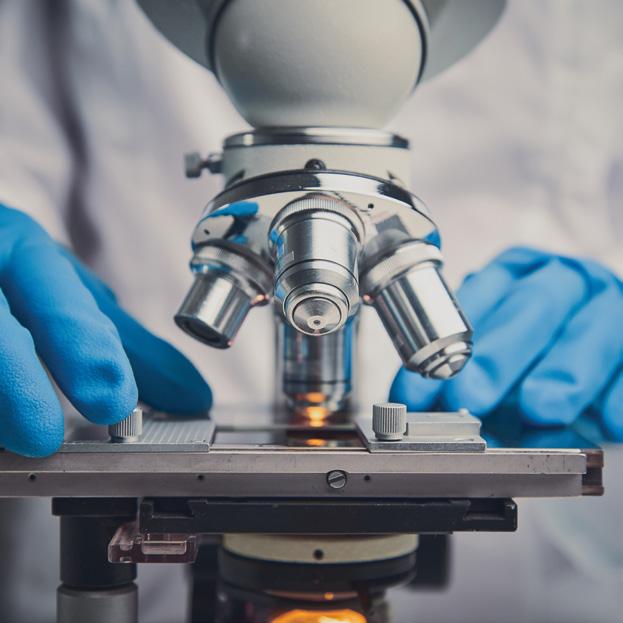
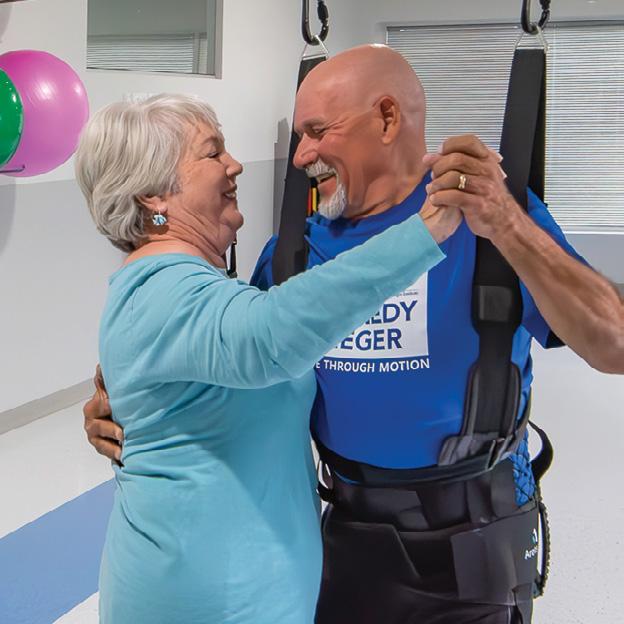
By Laura Farmer
Rohan gives it his all when working with others, whether it’s tutoring students or playing for the Kennedy Krieger Bennett Blazers’ wheelchair basketball team.
As the clock neared the end of the National Wheelchair Basketball Association’s East Coast Varsity Conference Championship game, Rohan speed-wheeled himself into position near his team’s basket. A teammate passed him the ball.
With just a few seconds remaining in the game, Rohan aimed, threw and—swoosh! He sunk the ball right as the buzzer went off. Cheers erupted from the crowd and from his teammates on the Bennett Blazers, Kennedy Krieger Institute’s adaptive sports team.
“He made progress by leaps and bounds.”
– Anjali

It was just one of many defining moments Rohan has experienced in his nearly 15-year journey with Kennedy Krieger following a traumatic brain injury at 5 years old that left him unable to talk or walk—at least for a time.
His parents, Anjali and Rajesh, embarked on a nationwide search for just the right rehabilitative program for their son. Impressed by the Institute’s integrated approach, they moved from Connecticut to Baltimore so Rohan could receive daily physical, occupational and speech therapies, as well as academic instruction, at the Institute’s Specialized Transition Program, a neurorehabilitative day hospital.
At Kennedy Krieger, “He made progress by leaps and bounds,” Anjali says. “When we first arrived, he could only sit in a wheelchair and make little movements. Within a month, he was learning how to walk using crutches. He started to say a few words, and words became sentences. His progress has been tremendous.”
The Kennedy Krieger staff, she adds, has become like family, especially Rohan’s Bennett Blazers coaches, Gwena and Gerry Herman; his educational specialist, Ali Adler; and Dr. Stacy Suskauer, the Institute’s vice president of pediatric rehabilitation and co-director of the Institute’s Center for Brain Injury Recovery.
Today, Rohan is an engaging 20-year-old whose many interests include basketball, swimming, math, music and participating in podcasts. He’s enrolled in Maryland’s Division of Rehabilitative Services, a job training program that helps him try out different career paths. Recently, he began “paying it forward” by volunteering at the STP and tutoring students with disabilities at his former middle school.
“I try to ‘push’ the students as much as possible so they can become 100% independent in their everyday work,” he explains.
“Having been through the special education process myself, it has helped me get a better perspective about how to help children with mild to severe disabilities. They can do everything their peers can do. The only thing is that they might need a little more help.”
Visit KennedyKrieger.org/RohanScore or use the QR code to watch Rohan score the final basket in the championship game.
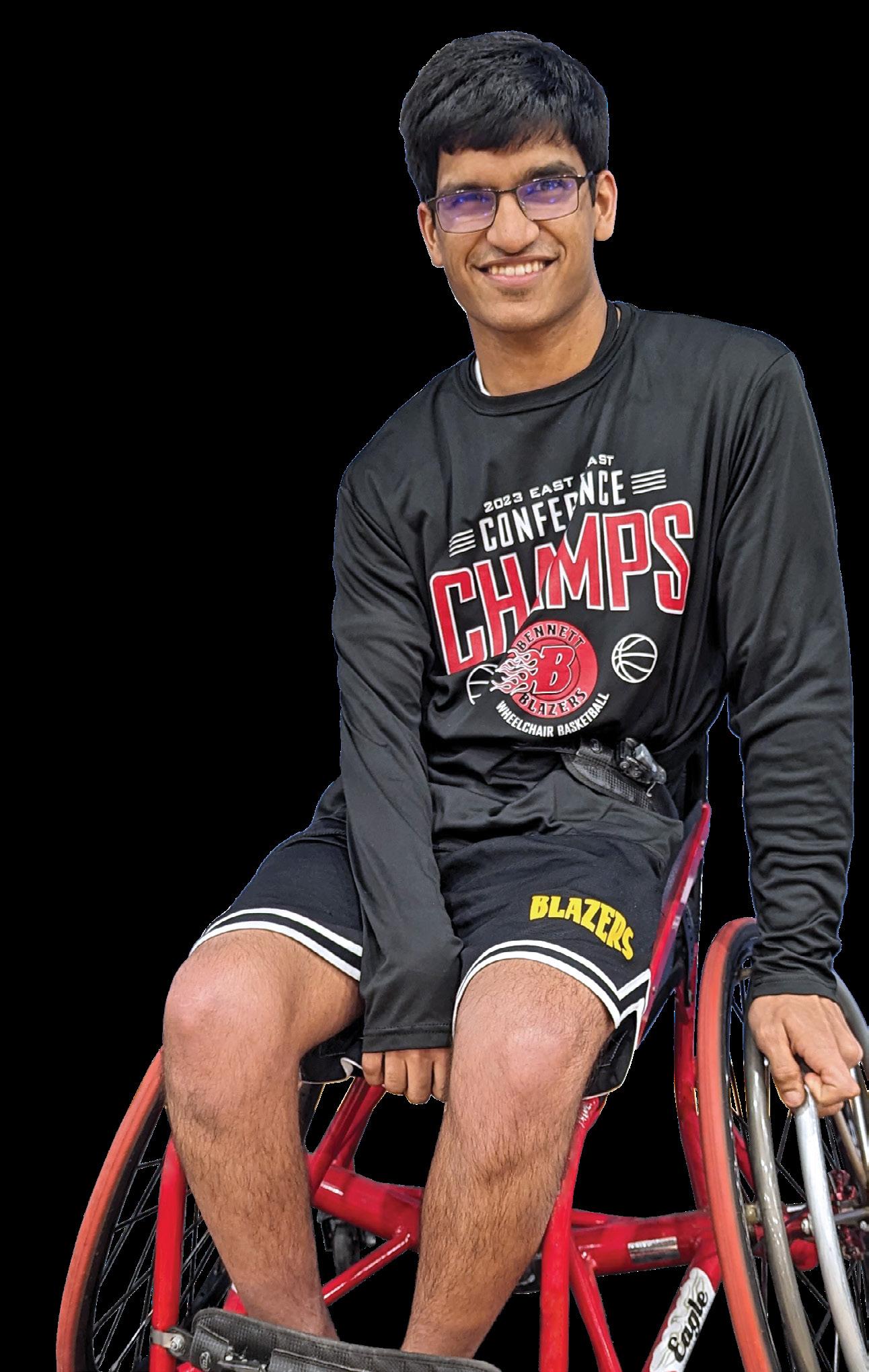

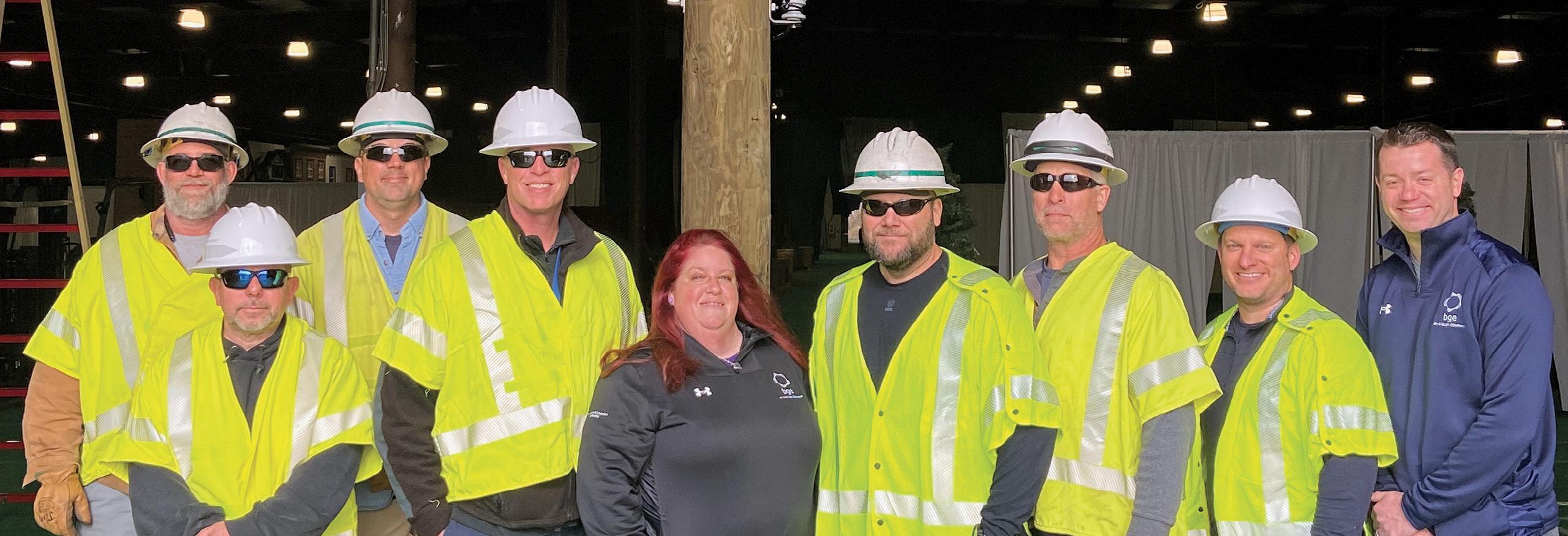
By Laura Farmer
Kennedy Krieger’s longstanding relationship with Maryland energy company BGE benefits both organizations, along with the Institute’s patients and students.
Two centuries ago, BGE, Maryland’s largest provider of natural gas and electricity, pioneered new technologies to bring light to the streets and homes of Baltimore. A little over a century later, Kennedy Krieger Institute (then called the Children’s Rehabilitation Institute) sparked a paradigm shift in its groundbreaking approach to interdisciplinary care. Perhaps it was inevitable that these two trailblazing organizations would eventually forge a novel partnership.
It’s difficult to pin down when this partnership began, possibly because BGE employees have been volunteering with Kennedy Krieger for decades, stepping in when needed at fundraising events or behind the scenes to support the Institute’s patients and students.
Over the years, the partnership has evolved into a symbiotic relationship in which benefits flow in both directions: BGE provides financial and volunteer support to Kennedy Krieger, while Kennedy Krieger offers thought leadership and education for BGE employees.
“We love our partnership with Kennedy Krieger, and we want to make sure our employees are aware of all of the opportunities it provides,” says Saba Idriss, senior corporate relations specialist at BGE.
Last year alone, BGE employees volunteered at Kennedy Krieger’s annual Festival of Trees and ROAR for Kids events, and at a gathering to sort through donated pajamas for patients staying at the Institute’s inpatient rehabilitation hospital. BGE also supports the Institute through event sponsorships and the BGE Dollars for Doers program.
One group at BGE that has been instrumental in strengthening this partnership is ENABLED, a resource group serving employees of Exelon, BGE’s parent company, with disabilities or who are caregivers for people with disabilities. ENABLED members planned two lunch-and-learn sessions over the past year—one on pediatric mental health, the other about behavioral addictions in teens to social media, gaming and internet use. Both were well-attended, as their topics were ones to which any parent might relate.
“We love our partnership with Kennedy Krieger.”
– Saba Idriss
An annual highlight for BGE employees is decorating a holiday tree to be sold at the Festival of Trees to raise funds for the Institute. It’s emblematic of the larger BGE-Kennedy Krieger relationship: “BGE employees are always very excited to work together and see what they can create for the Institute,” explains BGE community engagement manager Rotica Lewis. “I truly value this relationship and all that it brings to BGE employees, and all it allows BGE employees to do to support Kennedy Krieger.”
Visit KennedyKrieger.org/Corporate
Recent advances in treatment for Sturge-Weber syndrome at Kennedy Krieger Institute have allowed Quinnlyn to remain seizure-free while living a life full of possibilities.
As Doug drove his wife, Chrissy, and their newborn daughter home from the hospital, Chrissy Googled “facial birthmark” on her phone. Baby Quinnlyn had large port wine-colored birthmarks on her face, and they wanted to know why.
Doctors at the hospital had told Doug and Chrissy to have Quinnlyn’s eyes examined and to look out for anything unusual. That wasn’t reassuring…and neither was Google.
By Quinnlyn’s first appointment with her pediatrician a few days later, she had become very lethargic. The pediatrician referred her to a neurologist, who suspected SturgeWeber syndrome, a neurovascular disorder in which abnormal blood vessels can cause seizures by age 2. Quinnlyn’s facial birthmarks were a sign of the disorder. MRI scans ordered by the neurologist when Quinnlyn was 7 weeks old confirmed the diagnosis.
“We’re so thankful for Kennedy Krieger and Dr. Comi.”
– Quinnlyn’s dad
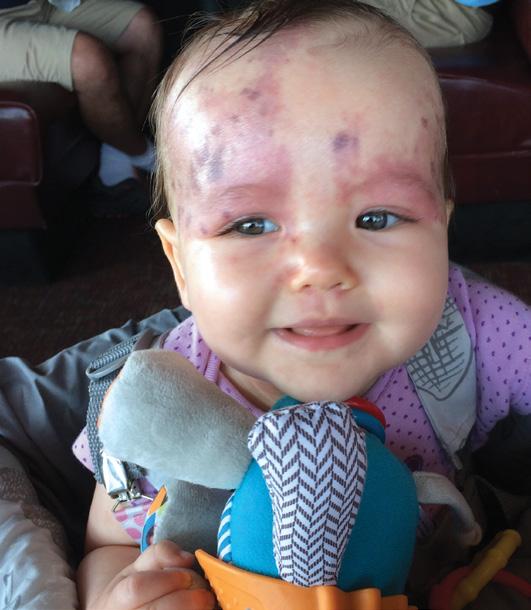
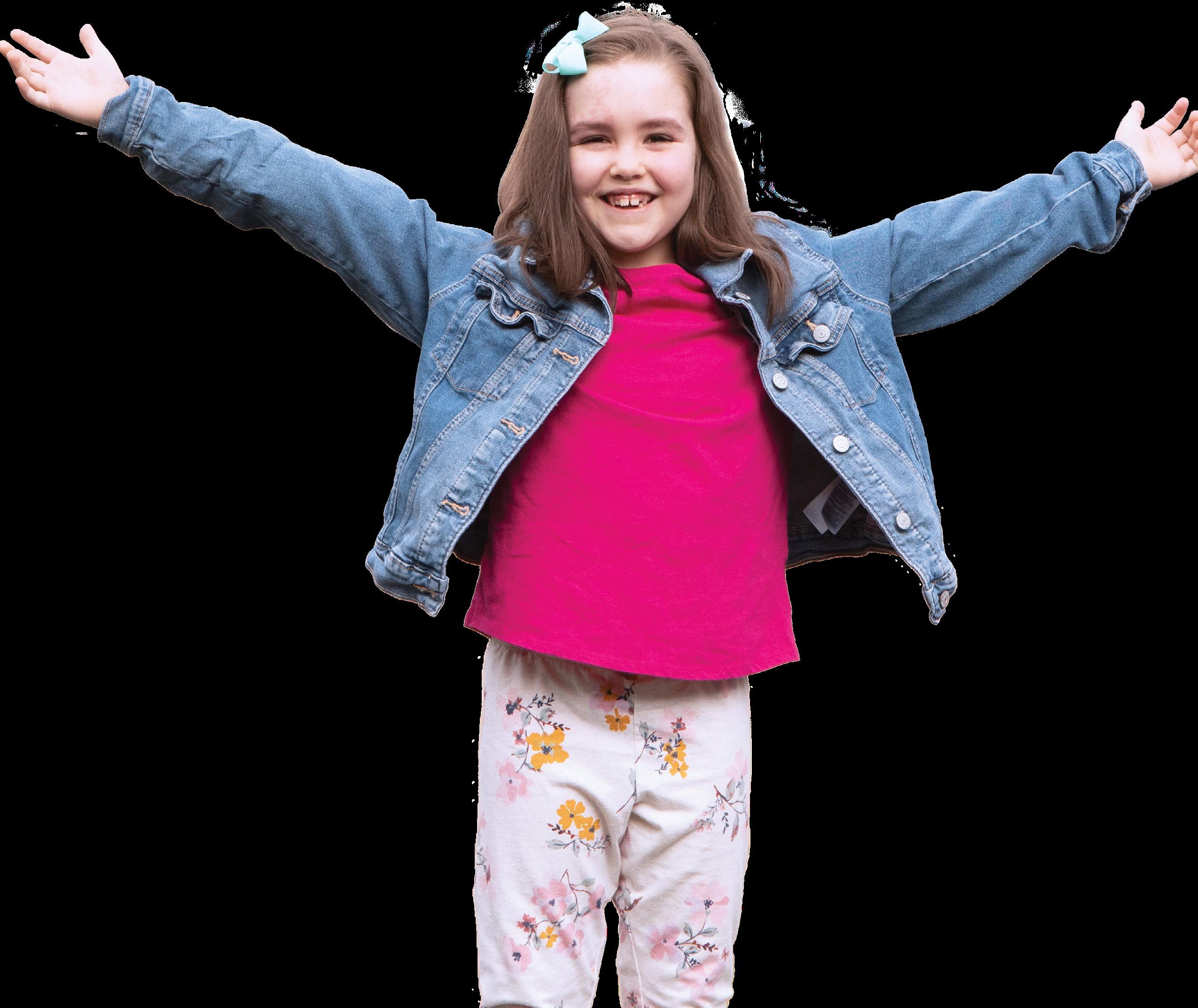



The neurologist recommended two things right away: Quinnlyn should start taking a low, daily dose of aspirin, something he’d heard from colleagues might help. He also recommended Doug and Chrissy take Quinnlyn to see Dr. Anne Comi at Kennedy Krieger Institute, just an hour from their home in Pennsylvania.
At 3 months old, Quinnlyn had her first appointment with Dr. Comi, who directs the Institute’s Hunter Nelson Sturge-Weber Syndrome Center. Dr. Comi confirmed the diagnosis and the likelihood of seizures starting within a couple of years. She also confirmed that a low dose of aspirin, combined with anti-seizure medications, could help keep the seizures from starting. Doug and Chrissy began the treatments, and brought Quinnlyn to Baltimore every three months for check-ins with Dr. Comi.
“Dr. Comi helped us understand Quinnlyn’s diagnosis and how to care for her, and that, with the right treatment, she’d be okay,” Chrissy says.
Dr. Comi is quite likely the best person Chrissy and Doug could have found to treat their daughter. Sturge-Weber syndrome is her life’s work. About a decade ago, she and her research team discovered the gene that, when affected by a mutation, causes the disorder—a requisite discovery for developing treatment. Earlier this year, she co-published the results of a study she led with researchers at Boston Children’s Hospital confirming that young children with SturgeWeber syndrome who start taking aspirin and anti-seizure medications while they’re still seizurefree were about 40% less likely to develop seizures at a young age. The study was based on years of observations of patients.
“The aspirin was initially proposed decades ago,” Dr. Comi explains. “I was using it for treatment once seizures began, so it made sense to try using it presymptomatically. That alone didn’t appear to make a difference, so I combined it with an antiseizure medication.”
It was a groundbreaking combination: With this treatment, many children born with Sturge-Weber syndrome never develop seizures at all. Quinnlyn, now 8, is one of them.
At first, Chrissy and Doug counted the weeks, then months, that went by without a seizure. “We made it six months, then a year, and every month, we recognize how far we’ve come,” Doug says. Now, they’re allowing themselves to imagine the very real possibilities and opportunities for their daughter.
“I hope she gets to live a long, happy life and do everything she dreams of, and continue to achieve what had seemed so unachievable when we first learned of her diagnosis,” Chrissy says.
Quinnlyn wants to be a veterinarian when she grows up, but in the meantime, she enjoys softball, theater, piano, and composing and performing songs with her band, the Rainbow Rockers. She also does physical therapy to maintain her strength. To children everywhere navigating a tricky diagnosis, Quinnlyn advises, “Be brave.”
Doug credits Quinnlyn’s good health to Dr. Comi, as well as to his daughter. “She’s always been so internally driven to move forward and conquer the day’s challenge,” he says. “She has this internal drive to always push past the limitations, and we hope that never changes.” – LT
Visit KennedyKrieger.org/SturgeWeber or use the QR code to learn more about Sturge-Weber syndrome.














discoveries at Kennedy Krieger bring hope and new possibilities




At Kennedy Krieger Institute, cutting-edge research fuels our passionate pursuit of possible breakthrough is a team of researchers making life-changing discoveries on a regular basis. neurological care and advances in medicine. – TG
Innovative research doesn’t just happen overnight. It takes years—and many researchers, financial contributions—to collect useful data. Take a look at how one recent research study unfolded over time:
Video-Based Analysis of Human Movement

Dr. Ryan Roemmich, research scientist at Kennedy Krieger
The Idea
Early 2020: With their threedimensional motion capture laboratory closed for the pandemic, Dr. Roemmich and Dr. Stenum look for more accessible ways to measure walking movements and gait. They begin investigating the accuracy of recording how a person walks using just a simple digital video camera— like that of a smartphone or tablet.
2
June 2020: Dr. Roemmich and Dr. Stenum submit a proposal for a research study to the Johns Hopkins Medicine Institutional Review Boards, which oversee research at Johns Hopkins and Kennedy Krieger.
September 2020: The review boards approve the study.
Late 2020–Early 2021:
Dr. Roemmich and Dr. Stenum receive funding from the National Institutes of Health, the American Heart Association and the American Parkinson Disease Association.
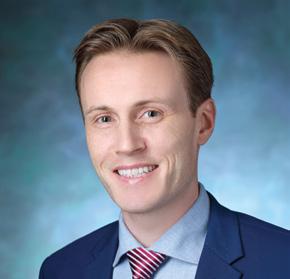
May 2021: Over 60 participants with neurologic conditions are recruited through Kennedy Krieger’s database and Johns Hopkins clinics, and the study officially begins. Kennedy Krieger’s Center for Movement Studies conducts research on 44 people who have experienced strokes and 19 people diagnosed with Parkinson’s disease.
5
Late 2023: The study reveals that videos recorded by home devices and enhanced by artificial intelligence algorithms can accurately track various medical and clinical aspects of walking.
If you are interested in supporting research at Kennedy Krieger Institute, please contact the Office of Philanthropy at
possibilities to patients and students, and their families. possible for every child. Behind every potential basis. Explore how our research is shaping pediatric
Here’s a peek at a few exciting research studies recruiting participants:
1
Principal investigator: Dr. Andreas Barth, cardiologist at Kennedy Krieger’s Center for Genetic Muscle Disorders
researchers, participants and study at Kennedy Krieger
Stenum, associate at the Hopkins University Medicine
6
Early 2024:
The focus shifts to determining if the technologies can be used to study other behaviors and allow clinicians to record quick videos of patients and immediately receive objective, comprehensive data, which would inform diagnosis, prognosis and treatment.
Dr. Roemmich and Dr. Stenum hope their work will encourage more clinicians across the U.S. to investigate similar alternatives when it comes to gait analysis.
Many new technologies, therapies, drugs, etc. require approval by the U.S. Food and Drug Administration or another regulating organization before they can be brought to market and used on a wide scale. It can take years to prepare new discoveries for approval, and even more time than that for approval to be granted.
Foundation@KennedyKrieger.org or 443-923-7300.
2 3
This study is gathering information about heart rhythm issues in patients with Duchenne muscular dystrophy. The research team is recruiting males with the disease who are at least 10 years old and familiar with extended heart-monitoring devices. Researchers will examine participants’ past and current medical records as part of the study.
Principal investigator: Dr. Rebecca Landa, vice president and executive director of the Institute’s Center for Autism Services, Science and Innovation (CASSI™)
Partnering principal investigator: Dr. Rachel Reetzke, speech-language pathologist at CASSI
Researchers at CASSI are studying the differences between in-person and virtually delivered social communication interventions for toddlers with autism. Each participating family completes a questionnaire about their child, and the child is developmentally assessed. Eligible families receive a 12-week communication intervention.
Principal investigator: Dr. Bradley Grant, medical director of the Institute’s Center for Child and Family Traumatic Stress
This study is evaluating an investigational drug for treating children and teens ages 10 to 17 with bipolar depression.
To learn about more Kennedy Krieger studies recruiting participants, visit: KennedyKrieger.org/Participate
Last fall, the International Center for Spinal Cord Injury at Kennedy Krieger Institute’s White Marsh location, about 15 miles northeast of downtown Baltimore, became home to the world’s first ZeroG 3D®, a groundbreaking gait trainer that allows individuals with spinal cord injuries full freedom of movement.
While Kennedy Krieger is no stranger to world-class rehabilitative technology, the ZeroG 3D stands apart from similar pieces of equipment due to the sheer scope of movement it allows.
“It’s absolutely a gamechanger,” says occupational therapist Dr. Rebecca Martin, the center’s manager of clinical research and education. Previous versions of the ZeroG limited users to walking only in a straight line, but the 3D version allows for movement in any direction. Patients can practice their gait, improve their balance and simulate activities of daily living, such as moving around a kitchen or laundry room. They can also ride a bike, play basketball and soccer, and even dance—the possibilities are endless.
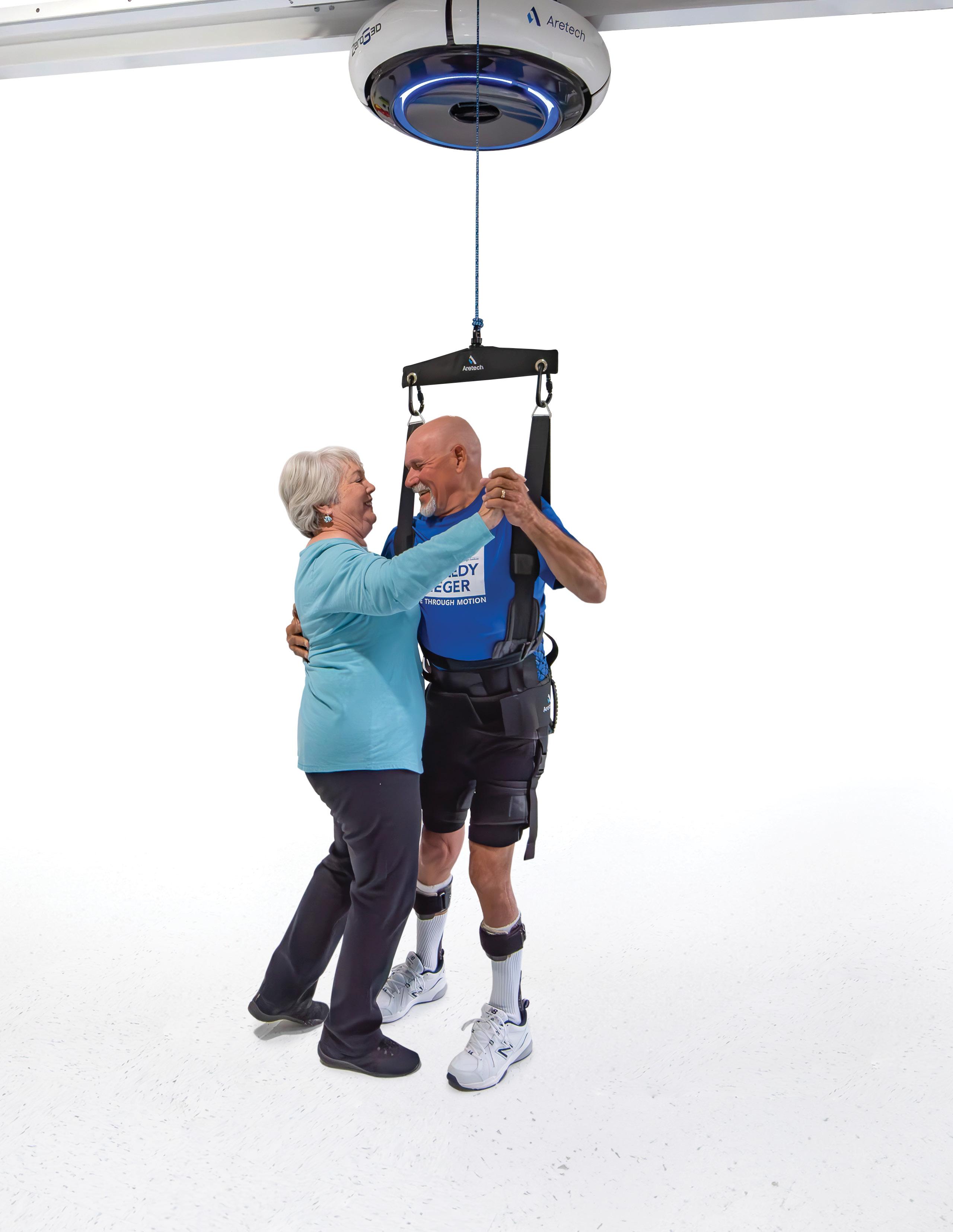
Kennedy Krieger is home to the world’s first ZeroG 3D®, a life-changing rehabilitation device allowing full freedom of movement for patients with paralysis.
The ZeroG 3D will be used primarily by patients who receive activity-based restorative therapy, which focuses on movement and activity to promote new connections between the brain and nervous system, thereby restoring functioning.
While the ZeroG 3D was introduced to the Institute less than a year ago, it’s already made a significant difference in the lives of many of the center’s patients. The ZeroG 3D has helped patients improve not only their range of motion but also their quality of life.
One of those patients is Jerry Sersen, who was hit by a car as a child. He started receiving services at the center in 2007, when his walking ability started to decline. He promised his wife, Karen, they would dance together again. But while he made significant strides in his recovery, he worried he might not be able to keep his promise.
Then Jerry started using the ZeroG 3D during therapy appointments, and he realized his promise was within reach. With the help of the ZeroG 3D, and under the lights of Kennedy Krieger’s White Marsh therapy gym, Jerry and Karen shared a dance. – KW
Use the QR code or visit Kennedy Krieger’s Instagram page at KennedyKrieger.org/ZeroG3DInstall to watch a time-lapse video of the ZeroG 3D’s installation.
“It’s absolutely a game-changer.”
– Dr. Rebecca Martin
At Kennedy Krieger, genetic counselors are part of integrated care teams that help patients and families navigate genetic testing and diagnosis.
At Kennedy Krieger Institute, clinicians treat more than 50 rare diseases, including leukodystrophies, muscular dystrophies, and Sturge-Weber, Rett and Kabuki syndromes, as well as many unnamed genetic conditions. Patients come to the Institute from around the world for treatment for rare diseases.
But before a rare disease can be treated, it must be diagnosed. That often means getting a genetic test—an analysis of a patient’s blood or saliva to reveal their DNA. The test could be for a specific condition, or it could be a broad examination of a patient’s DNA to look for variants in the DNA code that could be causing certain symptoms.
At Kennedy Krieger, genetic counselors collaborate directly with neurologists, neurodevelopmental pediatricians and other specialists—an approach pioneered at Kennedy Krieger—to bring advanced genetics expertise to clinicians and provide crucial genetic counseling to patients and their families, both before and after DNA tests are administered.
“We’re trained not only in determining which genetic tests are appropriate for a given patient, but also in talking families through the option of genetic testing and helping them understand and adapt to genetic test results and diagnoses,” explains genetic counselor Julie Cohen, the Institute’s director of genetic counseling services. “We provide guidance and emotional support throughout the diagnostic journey.”
Integrating genetic counselors as part of the care team ensures patients access genetic testing
in a timely manner, and enhances quality of care. Diagnosis opens the door to individualized treatments, medications and therapies, and to participating in clinical trials—often, the treatment offered in a clinical trial is the only one available for a given diagnosis.
Cohen and her fellow genetic counselors stay up to date on the latest research on genetic disorders, and they often contribute to research leading to the discovery of new disorders. They also connect patients and families with organizations supporting people with their specific rare diseases, as well as with other similarly impacted families.
“Genetic counseling has a multitude of benefits,” Cohen says. But it’s perhaps the personalized attention genetic counselors provide that is the most important benefit of all.
“When parents get a test result suggesting their child has a certain medical condition, the information can be hard to accept, even if they’ve been seeking an explanation,” says neurologist Dr. Constance Smith-Hicks, who directs the Institute’s Center for Synaptic Disorders. “Walking parents through the acceptance process is an important aspect of medical care that cannot be overlooked.” – LT
To learn more about genetic counseling at Kennedy Krieger, use the QR code or visit: KennedyKrieger.org/GeneticCounseling
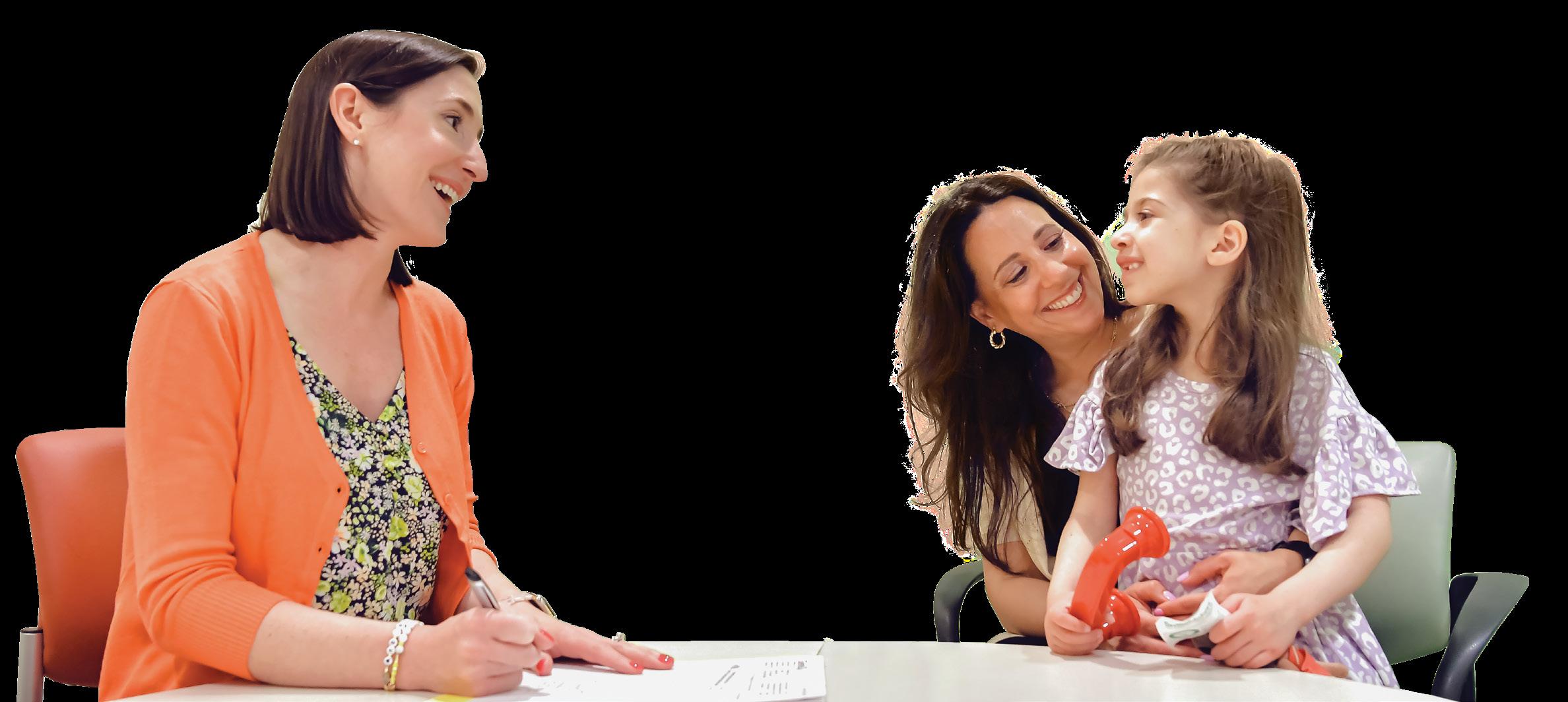
“Genetic counseling has a multitude of benefits.”
– Julie Cohen
Kennedy Krieger’s inclusive Early Childhood Development and Education Center, formerly PACT, serves as a model for early education centers across the state.
Teachers and doctors agree that the first five years of a child’s life are some of the most formative for growth and development. It’s a pivotal time for all children, and a critical one for children with atypical development or complex medical needs. Yet with the right supports in place, all children can thrive.
At Kennedy Krieger’s Early Childhood Development and Education Center, families find the supports their children need—children like Matheson, a dynamic, Peppa Pig-loving 4-year-old with a big vocabulary, a love for the color yellow and an appreciation for first responders, like his parents.
As a baby, Matheson was diagnosed with eosinophilic esophagitis and celiac disease, two conditions that make eating difficult and choking a potential hazard. These unique medical needs brought his parents to the center’s day care program. There, with full-time nurses and caring teachers, Matheson has thrived in the classroom, says his mother, Stephanie.
“There is no stopping him and the success he’s had,” she says. “The care and the attention of the staff here have allowed him to be so successful.”
Formerly known as PACT: Helping Children with Special Needs and renamed this past spring, the center is one of just a few in the state that provide child care to children with complex medical needs. It also offers a comprehensive preschool program for children with atypical development who learn alongside their typically developing peers.

Including typically developing children in the center’s programming is all part of the center’s new name and mission.
“We are an inclusive center where children with and without learning and developmental differences play and learn side by side,” says Assistant Vice President Marcella Franczkowski, the center’s executive director. “Each child gets what they need to accelerate their individual growth and development pathway.”
Located in Baltimore County, the preschool serves as a demonstration site for child care centers across the country, allowing the knowledge and expertise of this trained staff to reach beyond its walls.
Other services provided to the center’s students include speech, physical, occupational, music and pet therapies, and behavioral psychology, social work and family advocacy services. Students also benefit from the center’s partnership with Special Olympics Maryland, as physical activity positively impacts children’s growth and development.
Every day, Franczkowski says, “These engagements with families, staff members and the greater community are making a difference to our children.” – JG
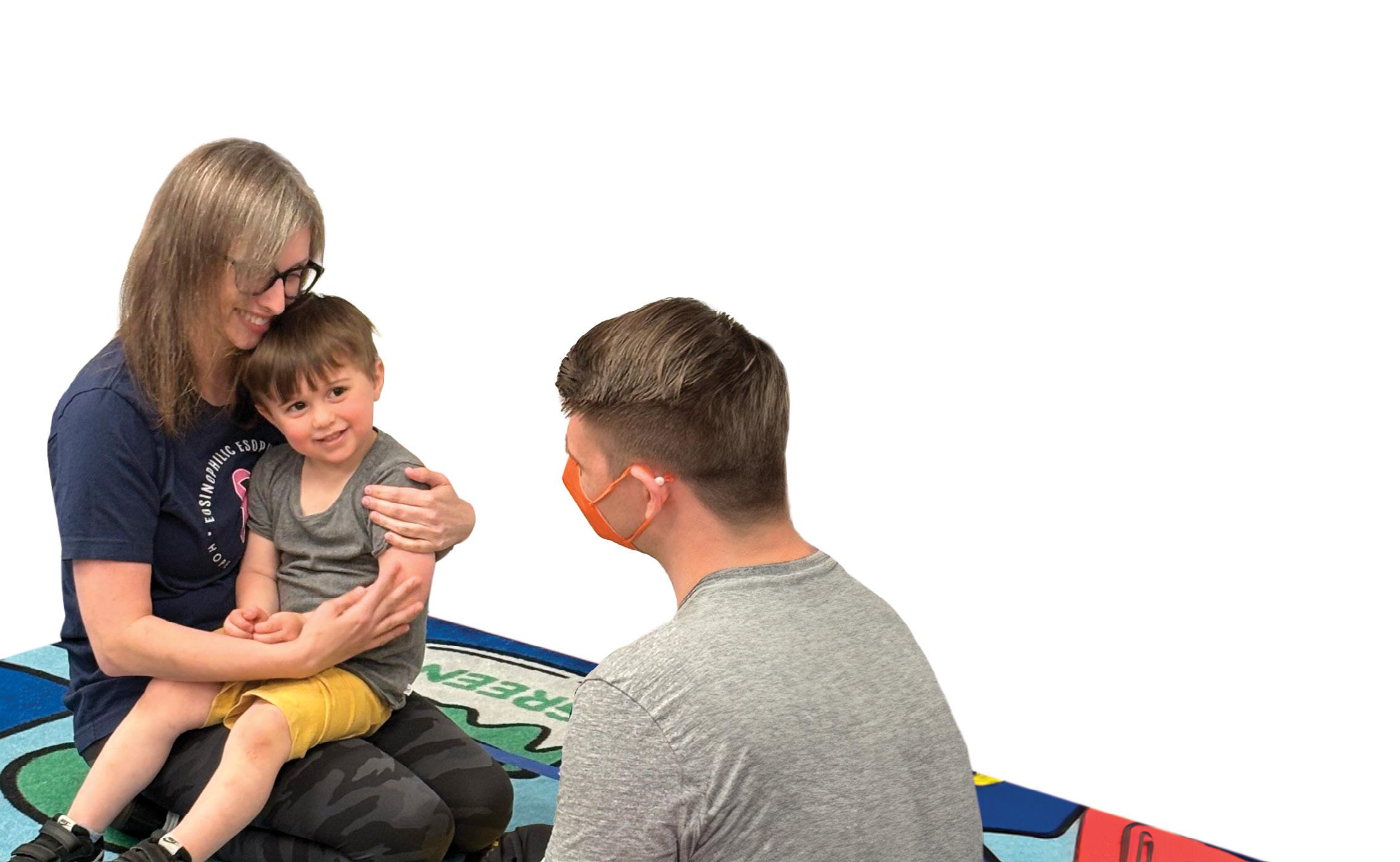
For more information about the Early Childhood Development and Education Center, use the QR code or visit: KennedyKrieger.org/EarlyChildhood
“Each child gets what they need to accelerate their individual growth.”
– Marcella Franczkowski

The new name for Kennedy Krieger’s autism center—the Center for Autism Services, Science and Innovation, or CASSITM —reflects the wide scope of the center’s work.
Earlier this year, Kennedy Krieger Institute announced a new name for its innovative and internationally renowned autism center: the Center for Autism Services, Science and Innovation, or CASSI™. This name reflects the achievements of the center, which opened in 1995, as well as advancements in the care, research and community understanding of autistic people since the center’s founding.
“As the first interdisciplinary autism center, we started with a mission of providing crucial services to our patients and students,” says Institute Vice President Dr. Rebecca Landa, the center’s founder and executive director. “Our new name more clearly reflects the scope of our work, yet also emphasizes that our primary mission has not changed—we are here to serve our patients and their families with excellence and the most scientifically supported approaches.”
Formerly known as the Center for Autism and Related Disorders, or CARD, CASSI provides clinical services to autistic children and teens, offers training internationally and has a fully fledged research arm. The center’s 225 staff members work across four sites—two in Baltimore; one in Columbia, Maryland; and one in Odenton, Maryland.
CASSI services are extensive and science-based, and they incorporate new innovations developed at Kennedy Krieger and beyond. Young children with autism participate in offerings like CASSI’s Achievements Program, which provides them with social, communication and early education skills for school success. Job training and classes in life and social skills are available for teens with autism. Researchers are exploring ever-better ways to diagnose autism, anxiety and other developmental conditions at an increasingly younger age.


In 2023, CASSI clinicians:
• Served more than 6,000 different patients
• Completed more than 950 coaching sessions for teachers, parents and child care providers
• Conducted more than 1,500 training sessions for professionals and community members
In 2023, CASSI researchers published more than 100 articles on topics including:
• Early autism detection using artificial intelligence
• Early services for autistic children with anxiety
• Understanding autism in girls
• The autism-gut connection
“The greater understanding of autism that exists today is directly related to the work of innovative centers like CASSI,” says Dr. Bradley L. Schlaggar, Kennedy Krieger’s president and CEO. “The new name reflects and includes critical aspects of the center’s work—using science and innovation to identify new and earlier ways to diagnose, support, treat, educate and prepare autistic individuals to pursue all that’s possible in their lives.” – JG
Visit KennedyKrieger.org/CASSI or use the QR code to learn more about the center and its new name.
Scan the QR code or visit KennedyKrieger.org/News for these stories and more!

Kennedy Krieger Institute gives high school students immersive look into healthcare field (April 30, 2024)
Working at Kennedy Krieger, you can make a difference as well as provide for your family, Chief Nursing Officer Shellie B. Williams told students.
12-year-old describes 4-year battle with long COVID (April 10, 2024)
Theo and his parents traveled to Baltimore for care at the Institute’s Pediatric PostCOVID-19 Rehabilitation Clinic.
Find out what’s happening at Kennedy Krieger in real time and join the conversation! Did you know we have new social media channels for research on Facebook and Instagram?
To find them, scan the QR code or visit: KennedyKrieger.org/Social
April 28, 2024: We came, we saw, we ROARed! Thank you to everyone who joined us last weekend and helped make the 20th annual #ROAR4Kids a ROARing success!
This year, more than 1,700 participants registered, and together, we raised $180,000 to help the children and families of Kennedy Krieger!
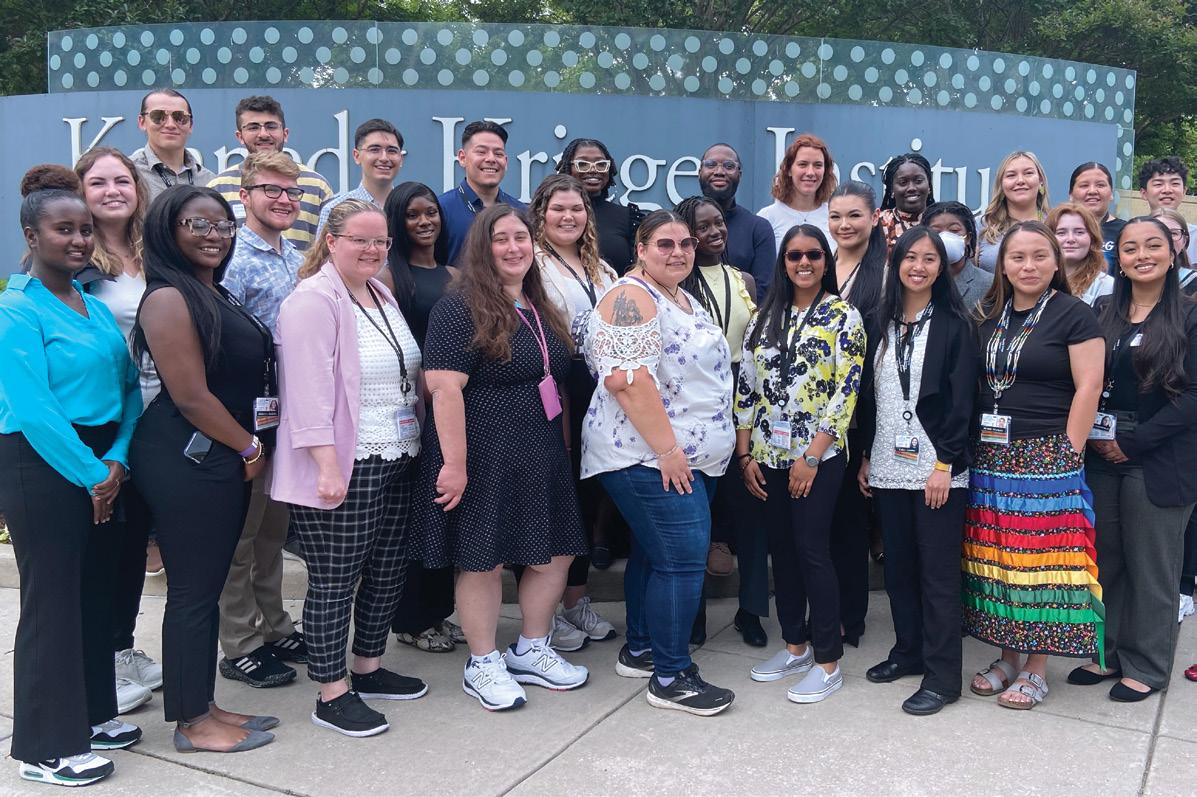
These identical twins both grew up with autism, but took very different paths (April 4, 2024)
One twin has high-support needs, while the other has low-support needs. Both were part of a twin study at Kennedy Krieger.
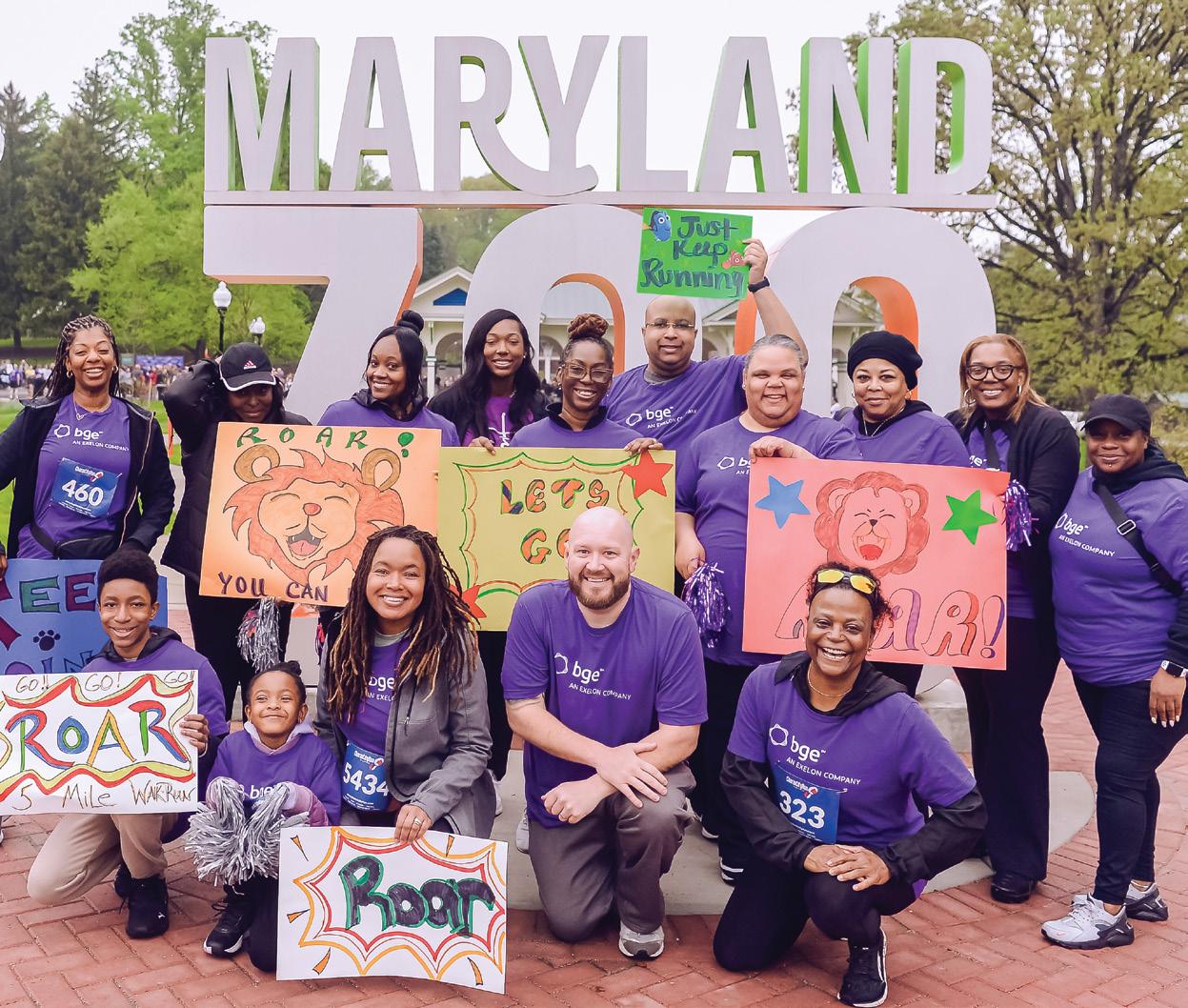
Nearly 1,000 people a year train at Kennedy Krieger as part of their academic education, from high school through the postgraduate level. Most are graduate or postdoctoral students who begin their fellowships or residencies at the Institute on July 1. Training participants come from all over the world to train at departments, clinics and programs across the Institute.
Our events are a great way to bring family and community members together! Scan the QR code or visit KennedyKrieger.org/Events to register, sponsor or explore events.

Baltimore Running Festival | Saturday, October 19: Join Team Kennedy Krieger to raise funds to support adaptive athletes in their training, rehabilitation and participation in events across the country!
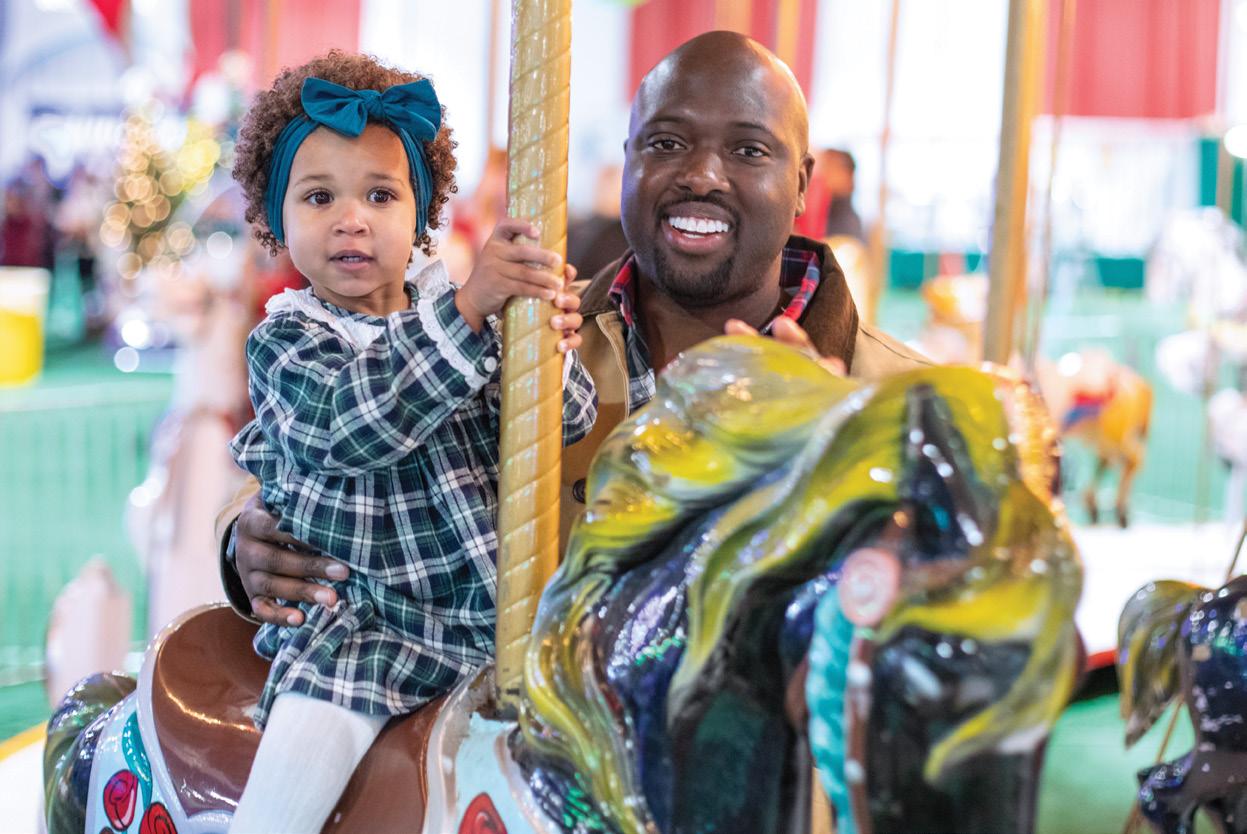
Festival of Trees | Friday–Sunday, November 29–December 1: This year marks the 35th anniversary of Baltimore’s original Festival of Trees, a spectacular and family-friendly event that benefits Kennedy Krieger.
The Fall Fête 5
Friday, October 4
NCRSF Charity Golf Outing Monday, October 7
Barrels & Bonfires Friday, November 1
The Maryland Daily Record named Kennedy Krieger President and CEO Dr. Bradley L. Schlaggar to its 2024 Health Care Power List, which includes some of the most influential leaders in the state’s healthcare industry and related professions. This is his second year in a row being named to the list.
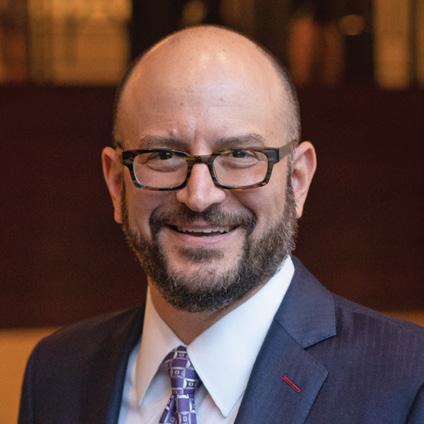
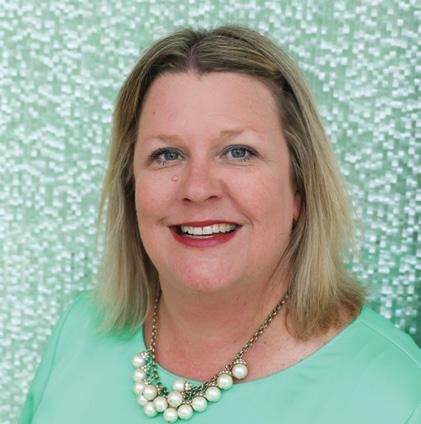
The Maryland Daily Record also named Kennedy Krieger Assistant Vice President Maureen van Stone, Esq. , director of the Institute’s Maryland Center for Developmental Disabilities, as a 2024 recipient of its Top 100 Women awards for the third time, and inducted her into its Circle of Excellence, highlighting her advocacy and legal services for people with disabilities.
Baltimore Magazine honored Kennedy Krieger nurse Theresa Paulsen and former Kennedy Krieger nurse Erin Dignan with its Excellence in Nursing award. Paulsen is the Institute’s director of quality, patient safety and professional affairs, and Dignan was the inaugural Institute winner of the Daisy Award, which recognizes nurses who excel in their jobs.
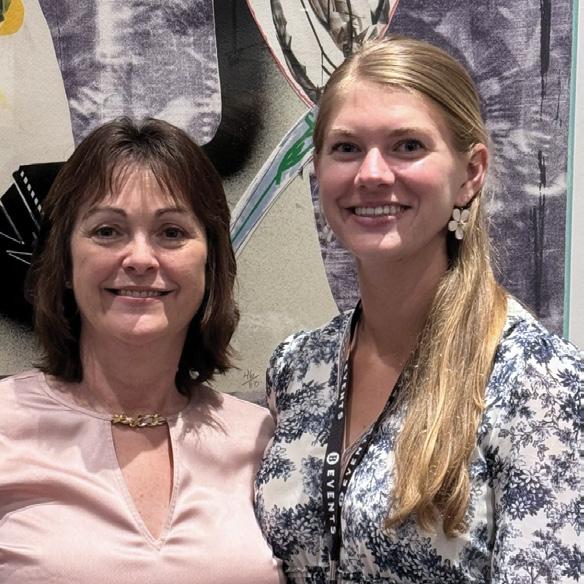
This year, Forbes named Kennedy Krieger one of “America’s Best Midsize Employers” and the top midsized employer in Maryland. The Institute employs about 3,000 people.
When you give to Kennedy Krieger Institute, you’re helping us pursue every possibility for children like Quinnlyn. Your gift supports groundbreaking education, research and care that bring hope and transform lives. Thank you so much!
Make your donation today! Visit KennedyKrieger.org/PS24 or use the QR code, or mail us your donation using the return envelope inside this issue.
The individualized care that Quinnlyn, 8, receives at Kennedy Krieger allows her to learn, play, grow and thrive. Read her story on Page 6.
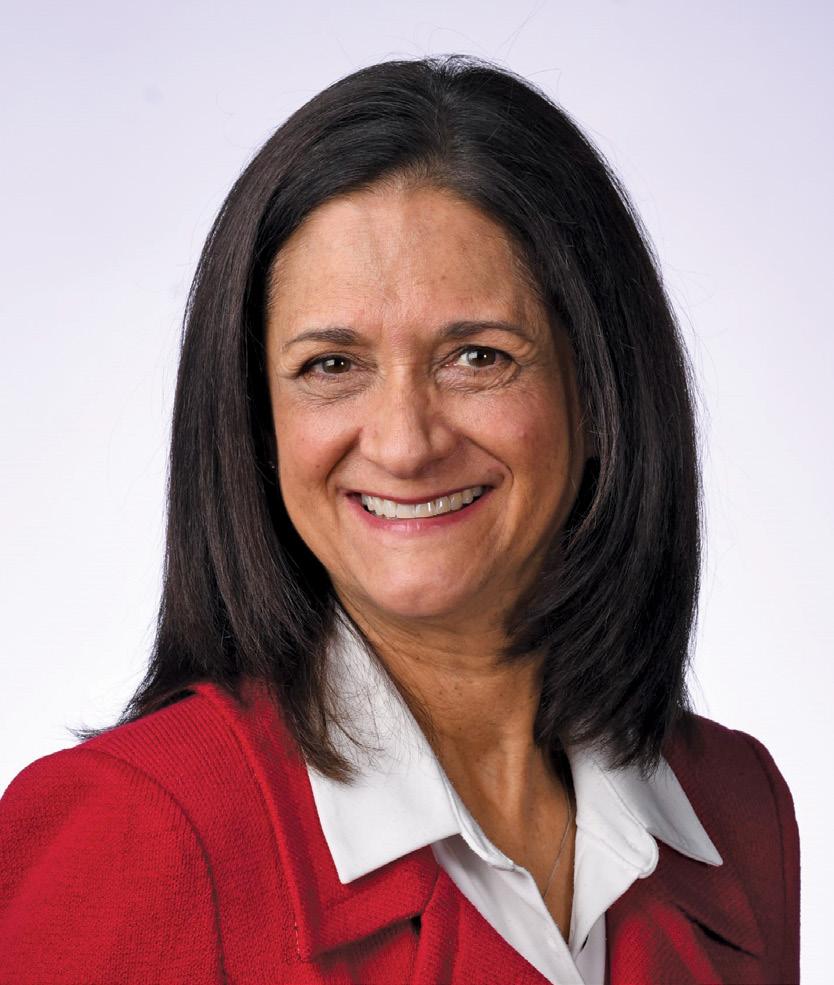
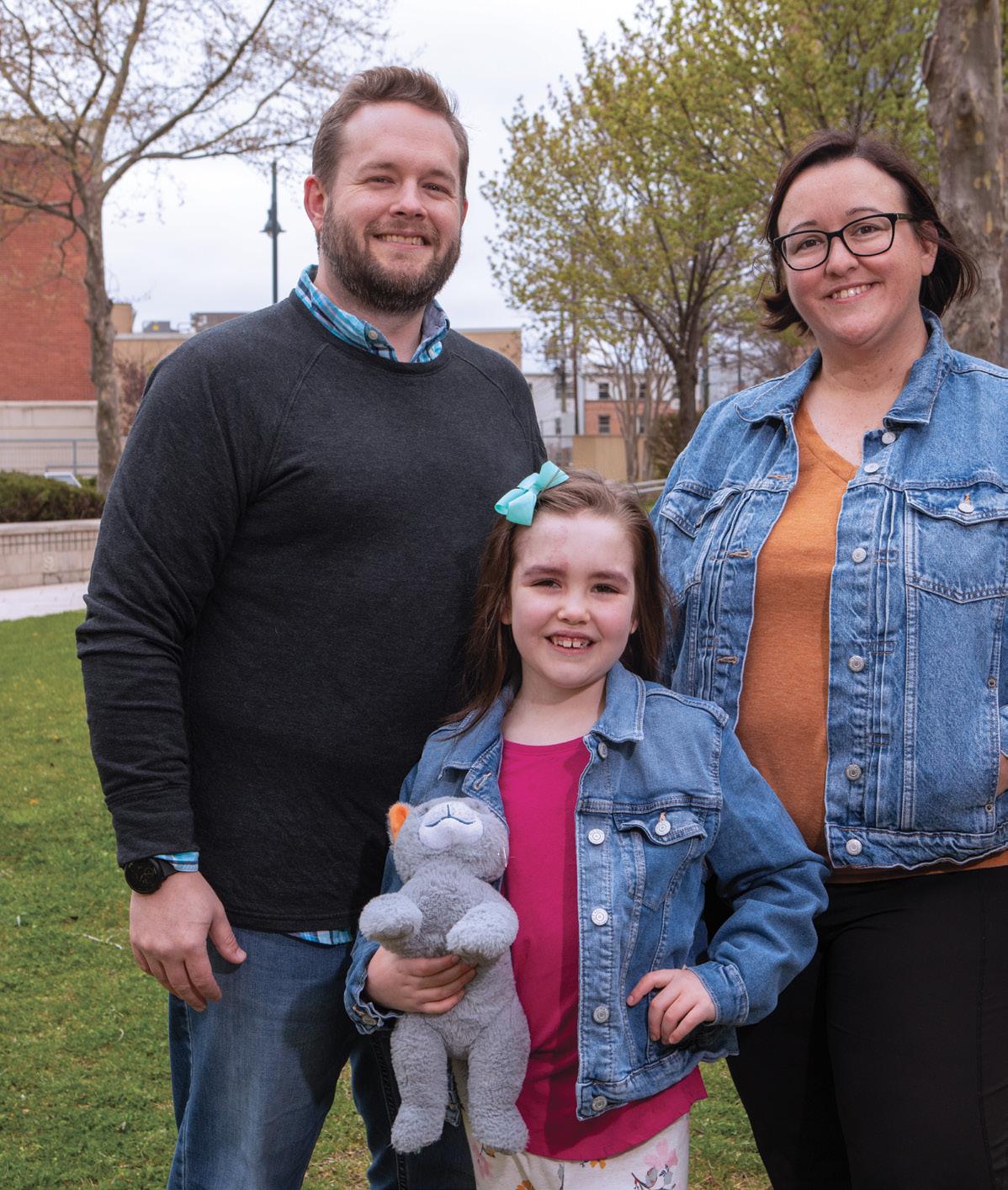
“I give to the Early Childhood Development and Education Center at Kennedy Krieger because of the positive impact the center’s staff, programs and whole person-centered approach have on young children from birth to age 5. The combination of early childhood education and therapeutic and clinical services is critical to ensuring each child has an equal opportunity to succeed.”
– AMY SOLOMON , chair of the Early Childhood Development and Education Center Board of Directors and a member of the Kennedy Krieger Institute Board of Directors